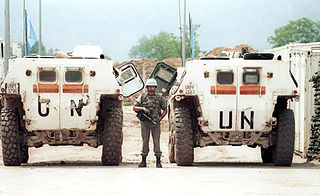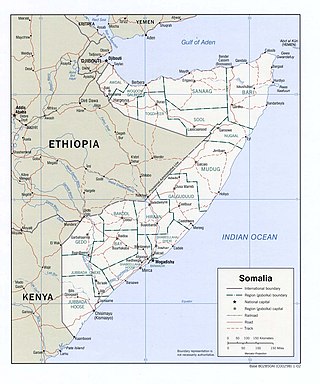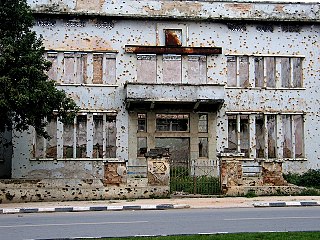
Peacekeeping comprises activities, especially military ones, intended to create conditions that favor lasting peace. Research generally finds that peacekeeping reduces civilian and battlefield deaths, as well as reduces the risk of renewed warfare.

United Nations Security Council resolution 743, adopted unanimously on 21 February 1992, after reaffirming resolutions 713 (1991), 721 (1991), 724 (1991), 727 (1992) and 740 (1992), and considering that the situation in the Socialist Federal Republic of Yugoslavia constituted a threat to international peace and stability, the council established a peacekeeping mission in the country, known as the United Nations Protection Force (UNPROFOR), with the aim of reaching a peaceful political settlement in the region.

United Nations Security Council resolution 745, adopted unanimously on 28 February 1992, after recalling resolutions 668 (1990), 717 (1991), 718 (1991) and 728 (1992), the council, after examining a report by the Secretary-General Boutros Boutros-Ghali on 19 February 1992, authorised the establishment of the United Nations Transitional Authority in Cambodia (UNTAC), following on from the political settlement agreed in Paris on 23 October 1991. It was the first occasion where the United Nations had taken over administration of a state, as opposed to monitoring or supervising.

United Nations Security Council resolution 824, adopted unanimously on 6 May 1993, after considering a report by the Secretary-General Boutros Boutros-Ghali pursuant to Resolution 819 (1993), the council discussed the treatment of certain towns and surroundings as "safe areas" in Bosnia and Herzegovina.

United Nations Security Council resolution 856, adopted unanimously on 10 August 1993, after reaffirming Resolution 813 (1993) and welcoming a peace agreement signed, under the auspices of the Economic Community of West African States (ECOWAS), between the Interim Government of National Unity of Liberia (IGNU), the National Patriotic Front of Liberia (NPFL), and the United Liberation Movement for Democracy (ULIMO), the Council approved a dispatch of 30 military observers to Liberia.

United Nations Security Council resolution 872, adopted unanimously on 5 October 1993, after reaffirming resolutions 812 (1993) and 846 (1993) on the situation in Rwanda and Resolution 868 (1993) on the security of United Nations operations, the council stressed the need for an international force in the country and therefore established the United Nations Assistance Mission for Rwanda (UNAMIR).

United Nations Security Council resolution 885, adopted unanimously on 16 November 1993, after reaffirming resolutions 733 (1992), 746 (1992), 751 (1992), 767 (1992), 775 (1992), 794 (1992), 814 (1993), 837 (1993), 865 (1993) and 878 (1993) on Somalia and Resolution 868 (1993) on the safety of United Nations peacekeeping personnel, the council authorised the establishment of a Commission of Inquiry to investigate attacks on the United Nations Operation in Somalia II which led to casualties.

United Nations Security Council resolution 892, adopted unanimously on 22 December 1993, after reaffirming resolutions 849 (1993), 854 (1993), 858 (1993), 876 (1993) and 881 (1993) on the Georgian–Abkhazian war and Resolution 868 (1993) concerning the safety of United Nations peacekeepers, the council discussed the phased deployment of 50 military observers in Georgia.

United Nations Security Council resolution 896, adopted unanimously on 31 January 1994, after reaffirming resolutions 849 (1993), 854 (1993), 858 (1993), 876 (1993), 881 (1993) and 892 (1993) on the Georgian–Abkhazian war and Resolution 868 (1993) concerning the safety of United Nations peacekeepers, the Council considered the possible establishment of peacekeeping force in Abkhazia and Georgia, and discussed the peace process.

United Nations Security Council resolution 897, adopted unanimously on 4 February 1994, after reaffirming resolutions 733 (1992) and 886 (1992) and all of its subsequent resolutions on Somalia, the Council discussed the role of the United Nations Operation in Somalia II in the peace process in the country.

United Nations Security Council resolution 913 was adopted unanimously on 22 April 1994, after reaffirming all resolutions on the situation in Bosnia and Herzegovina and also Resolution 908 (1994). The Council discussed the situation in the safe area of Goražde and a settlement of the conflict.
United Nations Security Council resolution 946, adopted on 30 September 1994, after reaffirming Resolution 733 (1992) and all of its subsequent resolutions on the situation in Somalia, the council extended the mandate of the United Nations Operation in Somalia II for a period of one month until 31 October 1994.

United Nations Security Council resolution 966, adopted unanimously on 8 December 1994, after reaffirming resolutions 696 (1991), 868 (1993) and all resolutions on Angola, the Council discussed the monitoring of a ceasefire in the country and extended the mandate of the United Nations Angola Verification Mission II until 8 February 1995.

United Nations Security Council resolution 981, adopted unanimously on 31 March 1995, after reaffirming all resolutions on the situation in the former Yugoslavia, the council established the United Nations Confidence Restoration Operation in Croatia (UNCRO) for a period terminating 30 November 1995.

United Nations Security Council resolution 1004, adopted unanimously on 12 July 1995, after recalling all resolutions on the situation in the former Yugoslavia, the council, acting under Chapter VII of the United Nations Charter, demanded that Bosnian Serb forces withdraw from the safe area of Srebrenica in Bosnia and Herzegovina and respect the safety of personnel from the United Nations Protection Force (UNPROFOR). The resolution was passed during the Srebrenica massacre.
United Nations Security Council Resolution 1935, adopted unanimously on July 30, 2010, after reaffirming all previous resolutions and statements on the situation in Sudan, the Council extended the mandate of the African Union – United Nations Hybrid Operation in Darfur (UNAMID) for a further 12 months until July 31, 2011 and demanded an end to fighting and attacks on United Nations personnel and civilians.

United Nations Security Council resolution 1502, adopted unanimously on 26 August 2003, after recalling resolutions 1265 (1999), 1296 (2000) and 1460 (2003), the council condemned violence against humanitarian workers and called upon all states to ensure that such incidents did not remain unpunished.

United Nations Security Council resolution 1554, adopted unanimously on 29 July 2004, after reaffirming all resolutions on Abkhazia and Georgia, particularly Resolution 1524 (2004), the council extended the mandate of the United Nations Observer Mission in Georgia (UNOMIG) until 31 January 2005.

United Nations Security Council resolution 1582, adopted unanimously on 28 January 2005, after reaffirming all resolutions on Abkhazia and Georgia, particularly Resolution 1554 (2004), the council extended the mandate of the United Nations Observer Mission in Georgia (UNOMIG) until 31 July 2005.

United Nations Security Council Resolution 2003, adopted unanimously on July 29, 2011, after reaffirming all previous resolutions and statements on the situation in Sudan, the Council extended the mandate of the African Union – United Nations Hybrid Operation in Darfur (UNAMID) for a further 12 months until July 31, 2012.


















